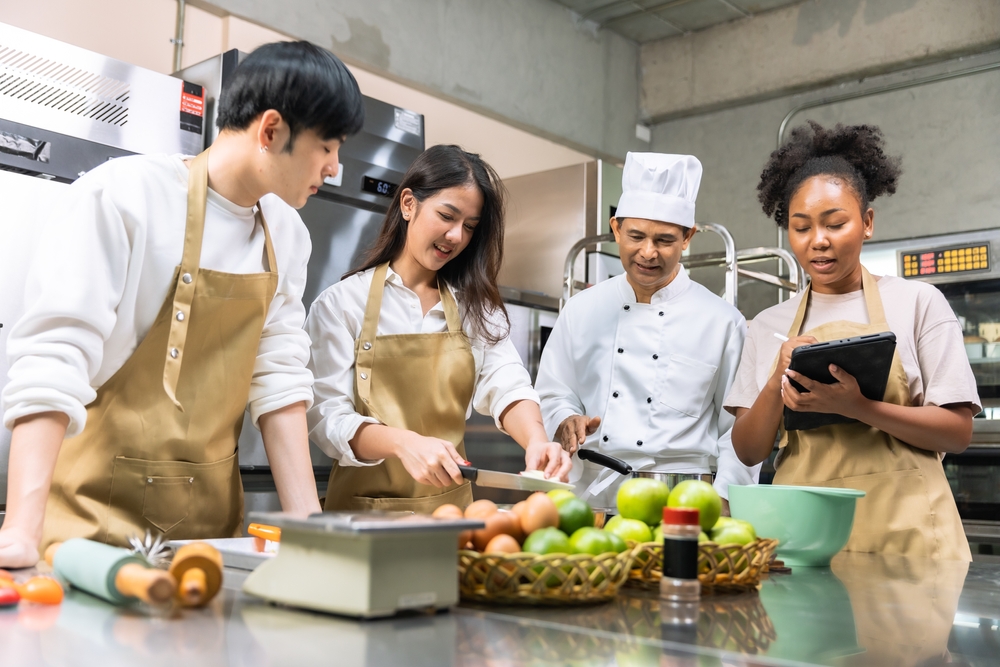Effective bar staff training is crucial for delivering exceptional guest experiences and maintaining consistent service standards. While general restaurant employee training provides a foundation, bartenders require specialized knowledge and skills to excel behind the bar. A well-structured training program ensures that your staff can confidently craft high-quality drinks, provide knowledgeable recommendations, and create memorable experiences that keep customers coming back.
Knowledge about drinks and their variations
All bartenders should be familiar with classic cocktails and the various twists on them. Inconsistent drink preparation can frustrate customers and damage your establishment’s reputation. You can avoid this by creating a comprehensive cocktail bible for your restaurant that includes the recipes of all drinks served at the bar.
Your training program should cover:
Classic Cocktails: Include drink recipes for Old Fashioned, Manhattan, Martini, Margarita, and a Mojito.
House Specialties: Train staff on signature drinks that set your establishment apart. They should understand the story behind each creation and be able to describe ingredients and preparation methods enthusiastically.
Wine and Beer Knowledge: A familiarity with your beer and wine list, including tasting notes, food pairings, and price points, will allow your bar and wait staff to help customers select complementary drinks that pair well with food orders.
Non-Alcoholic Options: With growing demand for mocktails and alcohol-free alternatives, ensure your team can craft creative non-alcoholic beverages with the same attention to detail as traditional cocktails.
Staff tasting sessions
Ensure consistency by hosting staff tasting sessions. The tastings foster a sense of camaraderie among employees, enabling them to discuss the drinks and effectively sell to guests. Tasting sessions will help ensure consistency as well.
Structure your tasting sessions around:
- New menu items
- Seasonal offerings
- Competitor analysis
- Food and drink pairings
Customer service excellence
Having quick refresher courses is a great way to help your bar staff strengthen customer service skills. You can give them tidbits of information about the restaurant’s best offerings and share your secrets to a good workday. This will cultivate interest in the drinks they are making and also inspire confidence during their shift.
Soft skills for bartenders
Beyond drink preparation, bartenders are often the face of your establishment, making their interpersonal skills crucial to your success. Training staff to read the room effectively means helping them understand guest preferences, energy levels, and service expectations.
Some customers want engaging conversation and a personal connection, while others prefer efficient, quiet service that allows them to enjoy their drinks without interruption. This intuitive understanding of customer needs forms the foundation of exceptional bartending service.
Advanced customer service skills include mastering natural upselling techniques that suggest premium spirits, wine pairings, or additional courses without being pushy or aggressive. Equally important is preparing bartenders for challenging scenarios such as managing over-intoxicated guests, addressing complaints about drinks, or maintaining composure during busy periods when patience runs thin.
Finally, help staff understand their vital role in creating and maintaining the specific atmosphere you want to achieve, whether that’s cultivating an intimate and sophisticated environment or fostering a lively and energetic vibe that keeps guests engaged and returning.
Technical skills and efficiency
Professional bartending requires mastering specific techniques and maintaining efficiency during busy periods. Ensure your training includes sections on:
Proper Technique: Train staff on correct shaking, stirring, muddling, and straining methods. Consistency in technique leads to consistency in flavor.
Speed and Organization: Develop systems for efficient bar setup, ingredient organization, and multi-order management during rush periods.
Equipment Mastery: Ensure staff are comfortable with all bar equipment, from basic tools to specialty machines like espresso makers or wine preservation systems.
Inventory Management: Train bartenders to monitor stock levels, identify when ingredients are running low, and maintain quality standards for perishable items.
Safety and legal compliance
Bar staff training must include essential safety and legal components to ensure responsible operation. Train staff to recognize signs of intoxication and implement clear policies for refusing service when necessary, while understanding all local alcohol service laws, ID checking procedures, and potential liability issues.
Maintaining strict sanitation standards is crucial, as it requires consistent cleanliness protocols for glassware, equipment, and work surfaces to ensure guest safety and compliance with health codes. Additionally, staff must be prepared to handle various emergencies, including accidents, medical emergencies, or security issues that may arise in the bar area. Your training should ensure they respond appropriately to protect guests and fellow employees.
Leveraging technology with the Bites platform
Modern bar staff training can be significantly enhanced through digital platforms that streamline the learning process and provide consistent, accessible resources. The Bites platform offers restaurant owners powerful tools to revolutionize their bar training programs:
Digital recipe management
Instead of relying on physical cocktail bibles that can get lost, damaged, or outdated, the Bites platform allows you to create and maintain a comprehensive digital drink database. Bartenders can access recipes, preparation notes, and ingredient specifications instantly from any device, ensuring consistency across all shifts and staff members.
Interactive training modules
Our platform empowers you to create engaging, multimedia training content that surpasses traditional methods. Include videos demonstrating proper pouring techniques, step-by-step cocktail preparation guides, and interactive quizzes that help staff retain important information about drink recipes and customer service protocols.
Progress tracking and analytics
Monitor individual staff member progress through training modules, identify knowledge gaps, and track completion rates. This data-driven approach helps managers focus their efforts on areas where additional training is needed most.
Real-time updates
When you introduce new cocktails, modify existing recipes, or update pricing, the Bites platform allows you to distribute these changes to all staff members instantly. No more outdated information or inconsistent preparation methods due to communication gaps.
Mobile accessibility
Staff can access training materials, recipe updates, and reference guides from their mobile devices, making it easy to review information during breaks or practice at home. This flexibility increases engagement and helps accelerate the learning process.
Standardized onboarding
Create consistent onboarding experiences for new hires by organizing all essential bar training materials in one centralized location. New employees can work through modules at their own pace while managers track their progress and identify when they’re ready for hands-on practice.
Performance integration
Connect training completion and performance metrics with scheduling and advancement opportunities, creating incentives for staff to engage actively with the learning platform and continuously improve their skills.
Building product knowledge through experience
The most effective training combines instruction with hands-on experience through several key approaches.
A rotation system should have new hires work alongside experienced bartenders during various shifts to understand the diverse customer demographics and service styles they’ll encounter.
Progressive responsibility helps build confidence by starting new employees with simple tasks and gradually increasing their responsibilities as their skills develop.
Cross-training encourages bartenders to learn about other areas of the restaurant operation, creating more versatile employees who can provide better overall service.
Finally, guest interaction practice through role-playing different customer scenarios helps staff develop confidence in handling various situations and personalities they may encounter on the job.
Conclusion
Investing in comprehensive bar staff training yields dividends through enhanced customer satisfaction, increased sales, and lower employee turnover. Remember that training is an ongoing process, not a one-time event. Regular refreshers, skill development sessions, and team-building activities keep your bar staff sharp and motivated.
Create a culture where learning is valued and excellence is the standard. When your bartenders feel confident in their abilities and take pride in their craft, that enthusiasm translates directly into better guest experiences and stronger business results. The time and resources invested in proper training will return many times over through improved service quality and customer loyalty.
Create your own training module and see how quickly you can onboard your restaurant staff.


















